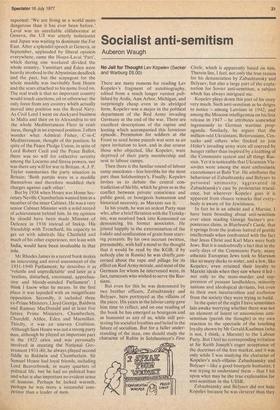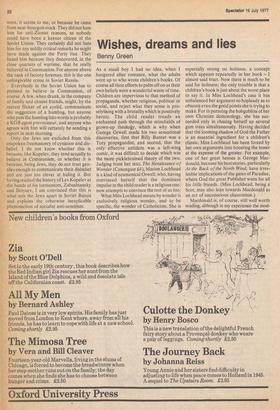Socialist anti-semitism
Auberon Waugh
No Jell for Thought Lev Kopelev (Secker and Warburg £6.00) There are many reasons for reading Lev Kopelev's fragment of autobiography, edited from a much longer version published by Ardis, Ann Arbor, Michigan, and surprisingly cheap even in its abridged form. Kopelev was a major in the political department of the Red Army invading Germany at the end of the war. There are excellent descriptions of the rapine and looting which accompanied this ferocious episode. Permission for soldiers at the Front to send home parcels was seen as an open invitation to loot, and in due course those who objected, like Kopelev, were deprived of their party membership and sent to labour camps.
Then there is the familar round of labour camp anecdotes — less horrible for the most part than Solzhenitsyn's. Finally, Kopelev invites us to debate the central contradiction of his life, which he gives us as the conflict between private conscience and public good, or bourgeois humanism and historical necessity, as Marxists see it.
In his youth, he was an ardent Party man who, after a brief flirtation with the Trotskyists, was received back into Komsomol on denouncing his former associates. He joined happily in the extermination of the kulaks and confiscation of grain from starving peasants. By his own account (written, presumably, with half a mind to the thought that it would be read by the KGB, if by nobody else in Russia) he was chieflysoncerned about the rape and pillage for its effect on Red Army morale, and most of the Germans for whom he intervened were, in ,fact, turncoats who wished to serve the Russians.
But even for this he was denounced by two brother officers, Zabashtansky and Belyaev, here portrayed as the villains of the piece. His years in the labour camp gave him time to reflect, and on one reading of the book he has emerged as bourgeois and as humanist as any of us, while still protesting his socialist loyalties and belief in the future of socialism. But for a fuller understanding of the man, one should study the character of Rubin in Solzhenitsyn's First Circle, which is apparently based on him. Therein lies, I feel, not only the true reason for his denunciation by Zabashtansky and Belyaev, but also a large part of the explanation for Soviet anti-semitism, a subject which has always intrigued me.
Kopelev plays down this part of his story very much. Such anti-semitism as he deigns to notice among Latvians in 1942, and among the Moscow intelligentsia on his first release in 1947 — he attributes somewhat ingenuously to German wartime propaganda. Similarly, he argues that the million-odd Ukrainians, Belorussians, Cossacks and others who flocked to join Hitler's invading army Were all coerced by hunger rather than inspired by a loathing of the Communist system and all things Russian. Yet it is noticeable that Ukrainian Vlasovites were among the most enthusiastic executioners at Babi Yar. He attributes the behaviour of Zabashtansky and Belyaev to personal animosity, aggravated in Zabashtansky's case by proletarian truculence, but wherever Kopelev goes it is apparent from chance remarks that every. body is aware of his Jewishness.
In fact he is an atheist and a Marxist. I have been brooding about anit-semitism ever since reading George Steiner's preposterous claim, in Bluebeard's Castle, that it springs from the jealous hatred of gentile intellectuals when confronted with the fact that Jesus Christ and Karl Marx were both Jews. But it is undoubtedly a fact that in the early days of the Communist Party, many atheistic European Jews took to Marxism like so many ducks to water, and a few, like Kopelev, even retained their loyalty to Marxist ideals when they saw where it led — not only to the mass-murder and suppression of peasant landholders, minority nations and ideological deviants, hut even to their own incarceration and exclusion from the society they were trying to build.
In the quiet of the night I have sometimes lain awake worrying whether there was not an element of latent or unconscious antisemitism (perish the thought) in my own reaction to the spectacle of the touching loyalty Shown by Mr Gerald Kaufman (who is not, I think, a Marxist) to the Labour Party. But I feel no corresponding irritation at Sir Keith Joseph's eager acceptance of the doctrines of the free market, and it was only while I was studying the character of Kopelev's arch-villains Zabashtansky and Belyaev — like a good bourgois humanist, I was trying to understand them — that I hit upon what may be the true explanation for anti-semitism in the USSR.
Zabashtansky and Belyaev did not hate Kopelev because he was cleverer than they were, it seems to me, or because he came from near-bourgois stock. They did not hate him for anti-Zionist reasons, as nobody could have been a keener citizen of the Soviet Union. They certainly did not hate him for any mildly critical remarks he might have made against the Party line. They hated him because they discovered, in the close quarters of wartime, that he really believed in Communism, For anyone above the rank of factory foreman, this is the one unforgivable crime in Soviet Russia.
. Everybody in the Soviet Union has to pretend to believe in Communism, of course. A few, when drunk, in the company of family and closest friends, might, by the merest flicker of an eyelid, communicate the suggestion of a humbug, but anyone who puts the humbug into words is probably a KGB agent provocateur, and anyone who agrees with him will certainly be sending a
report in next morning. ,
Only the Jews are excluded from this unspoken freemasonry of cynicism and disbelief. I do not know whether this is because, like Kopelev, they tend actually to believe in Communism, or whether it is because, being Jews, they do not trust gentiles enough to communicate their disbelief and are just too clever at hiding it. But having studied the history of Lev Kopelev at the hands of his tormentors, Zabashtansky and .Belyaev, I E1111 convinced that this is what sets the Jews apart in Soviet Russia and explains the otherwise inexplicable phenomenon of socialist anti-semitism.



































 Previous page
Previous page